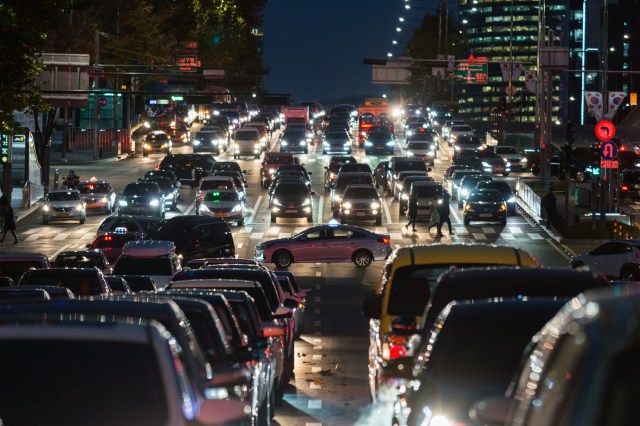Self-driving cars could make traffic jams a thing of the past: Getty

“We’ve just driven, completely autonomously, into a new era of transport!” hailed Richard Lutz, head of German rail operator Deutsche Bahn late last year as one of his driverless buses successfully carried its first passengers along an eight-minute route.
We tend to ignore the good news, amid all the complaints about how driverless vehicles will cost working-class people – those who drive trucks, say, or buses for a living – their jobs. So let me remind you: self-driving technology will save hundreds of thousands of lives, re-invent public transport, reshape our cities, and even increase demand for cars, thereby creating jobs for those same working classes.
But the safety factor is the most important gain. And it’s hard to argue with the figures. American National Highway Safety Administration estimated in 2007 that about 94% of all fatal accidents involved some type of driver error. Eliminate those, and more than 36,000 lives would have been saved in 2017 in the US alone – that’s nearly 100 a day. Extending autonomous vehicle technology to EU nations and economically developed countries in the Pacific regions would save another 36-40,000 lives annually. Make the technology cheap enough to use worldwide, and more than 1 million people would be saved, each and every year.
Yes, self-driving cars have been involved in some highly publicised fatal accidents over the past year, but the current technology is by no means ready to be mass-marketed. The technology that ultimately becomes standard will certainly be more sophisticated than it is at present and the massive reduction in accidents caused by driver error will far outweigh the few crashes caused by software malfunction.
Almost as welcome is the fact that these cars will make traffic jams a thing of the past and massively reduce urban pollution. It would reinvent our public transport system. Currently, over 75% of all work commutes in the US and 62% of all car trips in the UK are made by solo drivers, which is hugely inefficient. The key to fixing this rests on an issue that managers of aeroplane fleets know well: ensuring that vehicles are as full as possible.
With the help of driverless technology, commuters could easily schedule trips in carpools whose schedules match theirs perfectly. And without there being a driver to pay, costs would be dramatically less than in today’s Uber economy. Buses, which in the US are all too often empty outside of rush hour, could also be reprogrammed. The effect would be dramatic. A recent OECD study found that replacing human-driven cars with on-demand, driverless vehicles could cut the number of cars on the road in a medium-sized city such as Lisbon by nearly 90%.
Imagine how the urban landscape could be reshaped. Cities would need far fewer parking spaces because so few cars would sit idle. The liberated space could be repurposed for much needed housing or parks.
The benefits from all this progress would flow directly to poor and lower-income workers. Since low-cost housing traps them far from their suburban jobs, expensive, complicated and time-consuming commutes hit them hardest. Access to cheap, driverless cars would give them could the same sort of friction-free commuting experience their wealthier co-workers already enjoy and leave them with more time at home, spent with family.
Meanwhile, the chances are the advent of this technology would mean the creation of more jobs. Owners of driverless taxi fleets would, taking their cues from truck and airline owners, schedule their vehicles so they sit idle as little as possible; the vehicles would wear out quickly and would need regular replacement. At the same time, the significant drop in the cost of a vehicle mile travelled should significantly increase the demand for travel. More cars are going to be needed, not fewer.
Which isn’t to say we should all sit idly by and wait for the driverless future to arrive. Governments should be anticipating the coming changes and considering how to manage a future economy without those jobs that pay decent wages but require little formal education. Development of the autonomous vehicle is picking up speed and will ultimately make our lives vastly better, but we shouldn’t take our hands off the wheel quite yet.










Join the discussion
Join like minded readers that support our journalism by becoming a paid subscriber
To join the discussion in the comments, become a paid subscriber.
Join like minded readers that support our journalism, read unlimited articles and enjoy other subscriber-only benefits.
Subscribe